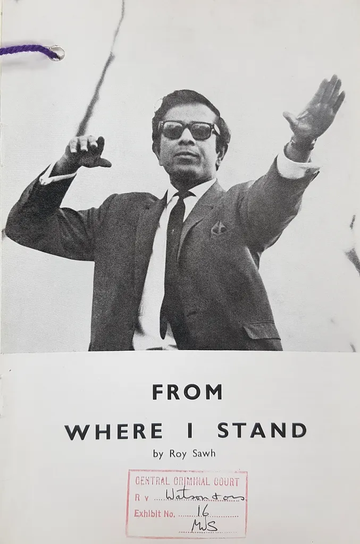
Roy Sawh
‐
Indo-Guyanese anti-racist activist, best known for his speeches at Speaker’s Corner in Hyde Park, London
Place of birth
Date of arrival to Britain
Date of time spent in Britain
1958–2023
About
Roy Sawh was born in Uitvlugt, British Guiana on a sugar estate where his father had been indentured since he was 6 years old. His upbringing was marked by poverty, much like similarly positioned labourers and their families in the British colonies. Sawh left British Guiana in his early twenties with the intention of becoming wealthy so he could relieve his family’s impoverishment.
He moved to London and worked as a bus conductor for London Transport. It was in his role as a cleaner at the Cumberland Hotel near Hyde Park that Sawh encountered Speaker’s Corner, a space in the park designated as a site for free speech by an Act of Parliament in 1872. Sawh’s desire to speak there catalysed his education in anti-racist, anti-imperial and Marxist thought, and he often frequented libraries during periods of unemployment. The philosophies of political Blackness were central to his speeches. Sawh’s speaking style was commanding, and he was eager to challenge the hecklers who would frequent his speeches. In a recording archived at the Bishopsgate Institute, for example, Sawh’s provocative, profanity-laden exchanges with audience members showcased his well-known speaking style, as he engaged in topics of contemporary relevance such as the Cold War and the election of Black MPs in the British Government. This style, which made him infamous, proved controversial.
In 1965 Sawh, alongside the Trinidadian radical anti-racist Michael De Freitas (also known as Michael X), founded the Racial Action Adjustment Society (RAAS), an outcome of Malcolm X’s visit to Britain in February 1965, where he met with Avtar Singh Jouhl of the Indian Workers’ Association in Smethwick and spoke at the Oxford Union. A week after the tour, Malcolm X was assassinated in Harlem, New York. RAAS’s first campaign was in support of South Asian strikers at Red Scar Mills in Preston. People who had become disillusioned with the Campaign Against Racial Discrimination (CARD) – which was perceived as too closely aligned to government actors – turned to RAAS and its more militant approach.
In 1967 Sawh was jailed for eight months after accusations by the police of inciting racial violence under Section 6(1) of the Race Relations Act of 1965. Detective Sergeant Francke and Detective Sergeant G. Battye noted that Sawh’s speeches were misogynistic, anti-Semitic, discriminatory towards white people and violent. This arrest was part of a broader police crackdown on radical anti-racist activity during the late 1960s and 1970s.
Sawh was a leading member of the Universal Coloured People’s Association (UCPA), a radical anti-racist organization which was founded by the Nigerian writer Obi Egbuna in 1967. After the civil rights activist Stokely Carmichael visited Britain in 1967, UCPA expelled its white members and became an organization solely for Black people (‘Black’ in this context also meant the inclusion of South Asian people). UCPA was Britain’s first Black Power organization and Sawh was second in charge. However, this position was short-lived. A disagreement between Sawh and Egbuna resulted in Sawh leaving UCPA, and Sawh subsequently founded the Universal Coloured Peoples and Arab Association. UCPA eventually dissolved in 1968, after Egbuna left to launch the British Black Panther Party. In 1968 Sawh was on the steering committee for Jagmohan Joshi’s Black People’s Alliance.
In 1969 Sawh began the Free University for Black Studies, an institution which used education and Black studies as a method of challenging racism and the capitalist system. The consciousness-raising function of racialized minority educators teaching racialized minority students was central to the institution’s practice. These practices were common among courses and institutions that were part of the Black supplementary education movement. The Free University for Black Studies ran until 1974 and had a high intake of students.
In 1987 Sawh published his book From Where I Stand, which tied together his personal experiences with the political philosophies underpinning his anti-racist activism.
Roy Sawh died on 23 April 2023.
From Where I Stand (London: Hansib Publications, 1987)
Blankson, Perry, ‘The British State’s Secret War on Black Power’, Tribune (23 October 2021)
Harris, Clive and James, Winston, Inside Babylon: The Caribbean Diaspora in Britain (London: Verso, 1993)
Searle, Kevin, ‘Roy Sawh: From Where I Stand’, National Archives (14 August 2023), https://blog.nationalarchives.gov.uk/roy-sawh-from-where-i-stand/
Sivanandan, A., Catching History on the Wing (London: Pluto Press, 2008)
Waters, Rob, Thinking Black: Britain, 1964–1985 (Berkeley: University of California Press, 2019)
SFTP/1/36, Roy Sawh, Bishopsgate Institute, London
WONG/6/26, Universal Coloured People's Association, c.1968–c.1970s, Black Cultural Archives, London
'Immigrant Leaders Unite in Alliance for Militant Action', Guardian (29 April 1968)
MS 2141/A/4/1, Letters to the Indian Workers Association, Library of Birmingham, Birmingham
MS 2141/A/7/17, Black People's organisations – Black Power etc., Papers of the Indian Workers’ Association, Library of Birmingham, Birmingham
CRIM 1/4777, Defendant: Sawh, Roy and others, National Archives, Kew, UK
DPP 2/4428, Racial Adjustment Action Society and Universal Coloured People's Association, National Archives, Kew, UK
Brace, Reginald, 'Muted Boast in the North', West Riding Hyle (11 June 1969)
For image and copyright details, please click "More Information" in the Viewer.
Image credit
Roy Sawh, 'From Where I Stand', 1967-1972, Records of the Central Criminal Court, CRIM 1/4777, National Archives, Crown Copyright. Courtesy of the National Archives.
